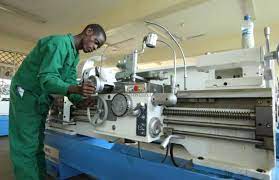NAIROBI, Kenya, Apr 27- The China Education Association for International Exchange (CEAIE) and the Association of Technical Universities and Polytechnics in Africa (ATUPA) have entered into a pact to improve the professional and technical ability of administrators and trainers in African technical training institutions.
The training programme is one of the sub-projects under the framework of the “Future of Africa, China-Africa Vocational Education Cooperation Program” and will be implemented by China Education Association for International Exchange (CEAIE) and ATUPA.
The training program consists of two parts: online training and offline teaching and targets institutions leaders of African projects, teaching principals, and relevant professional leaders.
Beneficiaries will train on theoretical knowledge, frontier professional technology, educational philosophy, teaching methods, curriculum design, and evaluation.
Mr. Johannes Mutiku the Secretariat of the Association of African Technology and Applied Universities and Colleges says this is a major milestone for the technical training institutes across the African landscape.
“The newly launched offline teaching training program is key in upscaling the level of technical training within the continent.” He said in an interview.
Mutiku explained that “the trainers’ ability will be upgraded to meet global standards and will not only learn advanced teaching concepts but also strengthen their theoretical basis, practical ability and understanding of the integration of industry and education.”
The off-line teaching aims to improve the professional and technical ability of administrators and trainers in African institutions through practical training, strengthen the communication and exchange between Chinese and African teachers, and help cultivate African technical and skilled talents.
The off-line training in Kenya is organized by AVIC International and includes on-site study and investigation of electrical engineering in three landmark projects in and around Nairobi namely; GTC (Global trade center), Two rivers, and Karimenu II dam.
22 students from the Technical University of Kenya and two representatives from the Africans Association of technology and applied universities and colleges participated in the event.
This transnational vocational education training program is organized by China Education Association for International Exchange which is a beneficial exploration to share Chinese TVET experience to the world, and greatly expands the breadth and depth of Sino-African vocational education cooperation.
It comes at a time when the COVID-19 has altered the technical training within the continent that has led most of the training institutes to embrace E-learning platforms.
Prof Edwin Ataro, Executive Dean, Faculty of Engineering & Built Environment at the Technical University of kenya (TUK) says initiative by a development partner like China will also benefit students pursuing engineering-related courses.
“As a technical university we are on the near end of signing a four years Memorandum of Understand with Zhejiang Institute of Mechanical and Electrical Engineering where 23 engineering lecturers from TUK will be trained on eight key areas of engineering related courses with goal being to boost their training skills which they will pass it to their students hence improve the quality of the graduates from these engineering fields.” Prof Ataro said.
The eight engineering fields include Electrical & Electronics, Civil & Resource Engineering,
Engineering & Built Environment, Aerospace and Vehicle Engineering, Chemical & Bio-systems Engineering, Survey Geospatial Science, Construction and Property Studies, Architectural & Spatial Planning.
Prof Ataro revealed that the pact will also cover a sandwich program where TUK undergraduate engineering students will travel to China for a one year for training.
“We target to have 30 students from our Electrical Engineering department travel to China on a sandwich program every academic year. They shall be trained by trainers from our Chinese technical institute and this is aimed at enhancing their skills to global Chinese standards. Once they graduate they can also work for Asian companies or come back home and help improve the standard of engineering training in Kenya”
Ataro clarified this as another sub-project under the framework of the “Future of Africa, China-Africa Vocational Education Cooperation Program, which involves African and Chinese universities and colleges to work in pair to deliver 1+2+1 or 1+1.5+0.5 programs, in which African students study in their own countries as well as in China for Bachelor’s degree or diploma and a skills certificate.
“One of the biggest challenge most engineering departments in Africa is lack of training equipment and sufficient lecturers with global skills to impact our graduates. This is why we have tailored our training to have a combine approach that will see our lecturers trained up to PhD level to help in improving the quality of training as well as address the shortage of these two skills.” Ataro added.
In the next five years the Engineering department plans to foster industry-based partnerships that will see them commercialize their innovations.
“We are looking at income generating partnerships with global industry leaders like AVIC international where we can partner on project based so that the institute can generate an additional income which we can use to purchase some of the state of the art equipment for training.’ Reveals Prof Ataro.
In 2021 Chinese President Xi Jinping during the 8th Forum on China-Africa Cooperation promised to scale up the TVET sector in Africa .
The Future Africa-China-Africa Vocational Education Cooperation Plan is an important part of the Capacity Building Project of the “Nine other Projects” proposed by President Xi Jinping.
Want to send us a story? Contact Shahidi News Tel: +254115512797 (Mobile & WhatsApp)


